外研版(2019)必修 第二册Unit 4 Stage and screen Using language课件(共18张)
文档属性
| 名称 | 外研版(2019)必修 第二册Unit 4 Stage and screen Using language课件(共18张) | 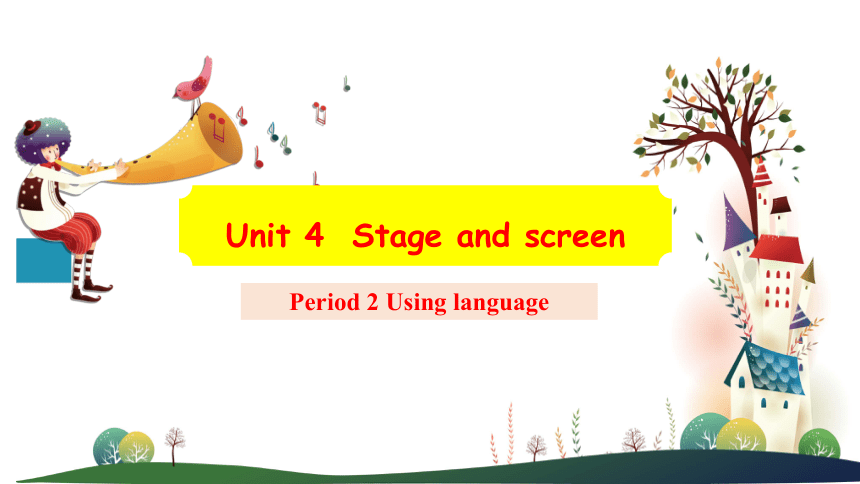 | |
| 格式 | ppt | ||
| 文件大小 | 1.9MB | ||
| 资源类型 | 教案 | ||
| 版本资源 | 外研版(2019) | ||
| 科目 | 英语 | ||
| 更新时间 | 2024-11-16 16:02:37 | ||
图片预览

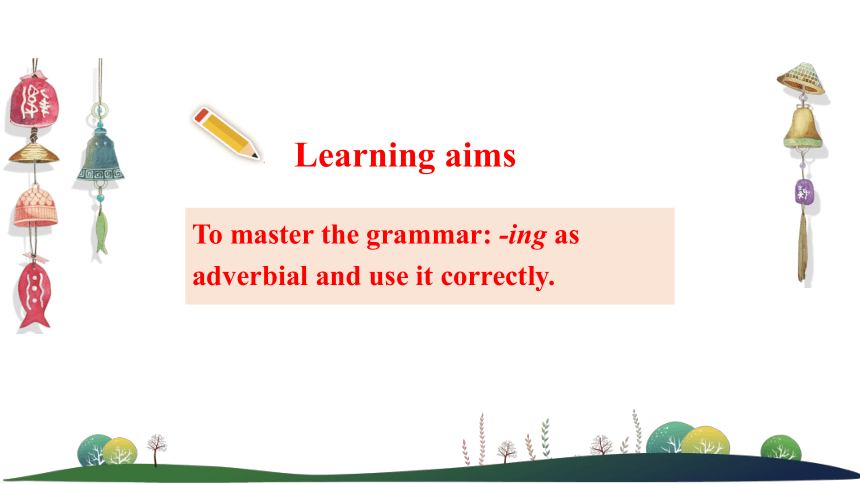
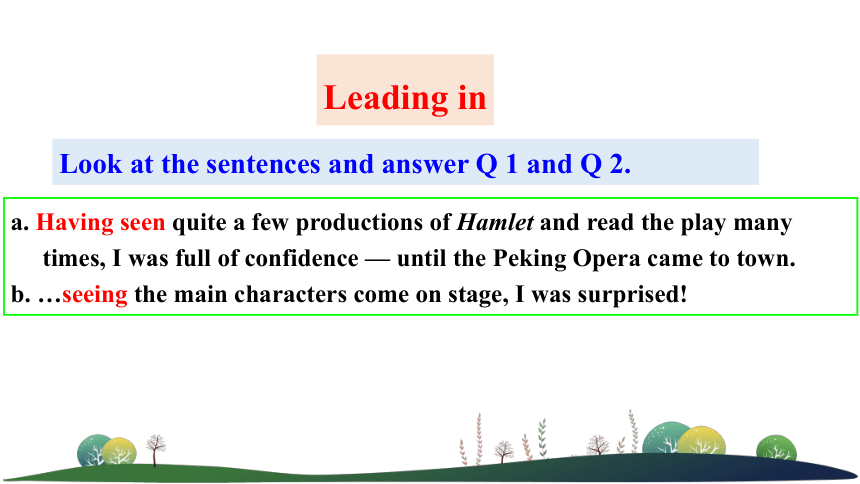
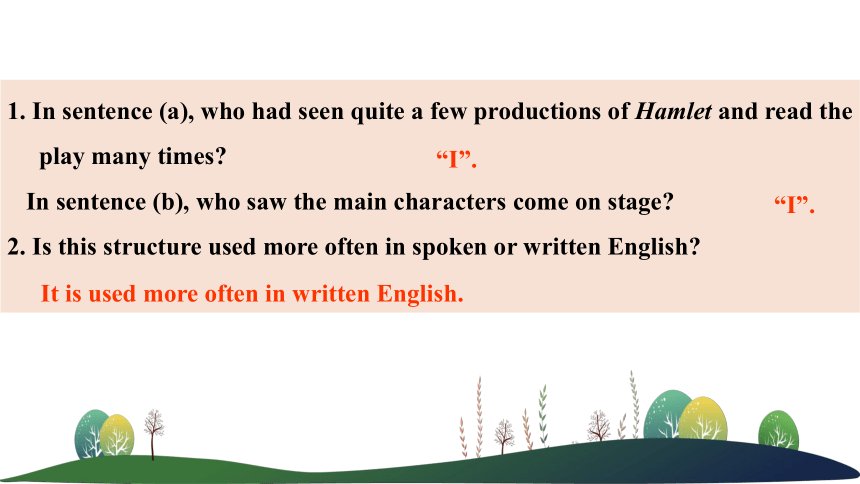
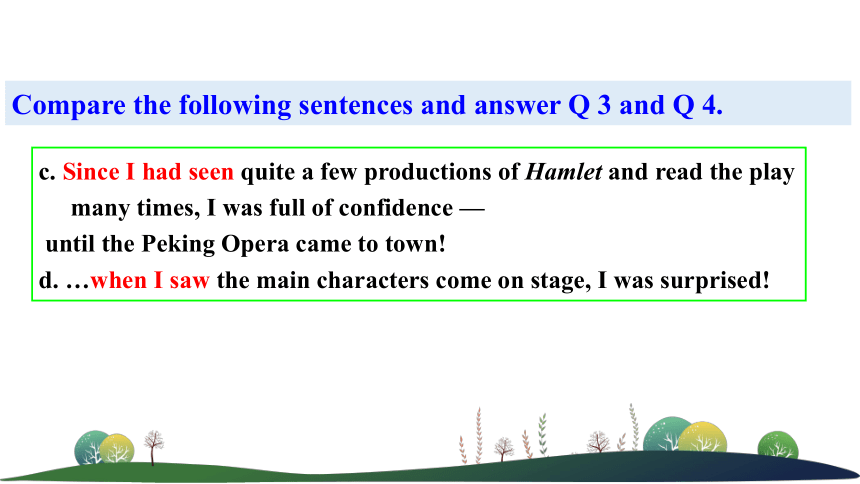
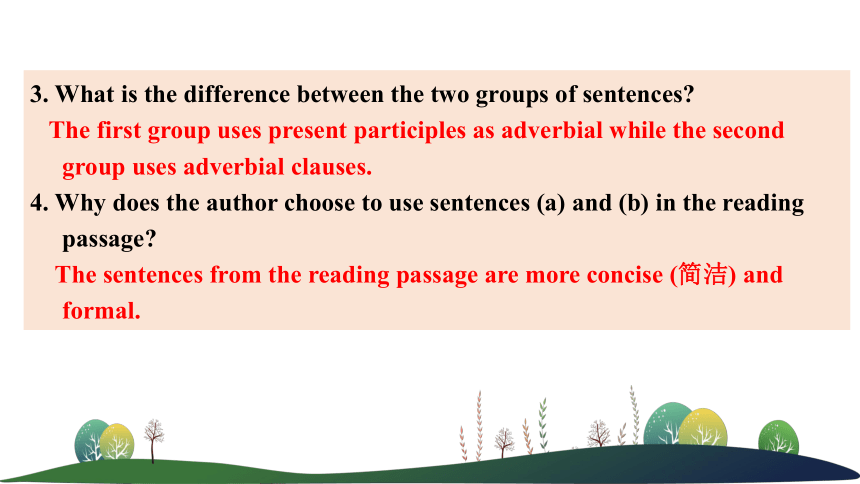

文档简介
(共18张PPT)
Unit 4 Stage and screen
Period 2 Using language
To master the grammar: -ing as adverbial and use it correctly.
Learning aims
Look at the sentences and answer Q 1 and Q 2.
a. Having seen quite a few productions of Hamlet and read the play many times, I was full of confidence — until the Peking Opera came to town.
b. …seeing the main characters come on stage, I was surprised!
Leading in
1. In sentence (a), who had seen quite a few productions of Hamlet and read the play many times
In sentence (b), who saw the main characters come on stage
2. Is this structure used more often in spoken or written English
“I”.
“I”.
It is used more often in written English.
Compare the following sentences and answer Q 3 and Q 4.
c. Since I had seen quite a few productions of Hamlet and read the play many times, I was full of confidence —
until the Peking Opera came to town!
d. …when I saw the main characters come on stage, I was surprised!
3. What is the difference between the two groups of sentences
The first group uses present participles as adverbial while the second group uses adverbial clauses.
4. Why does the author choose to use sentences (a) and (b) in the reading passage
The sentences from the reading passage are more concise (简洁) and formal.
现在分词是非谓语动词的一种,兼有动词和形容词的特征,在句中可作表语,定语,宾语补足语和状语,一般表示进行或主动的意思。
现在分词用作状语时,其逻辑主语必须与句子的主语一致,表示的动作
和句子的主语是主动关系。现在分词在句中可以作时间、原因、条件、让
步、方式、伴随、程度和结果状语。
现在分词短语作状语
【知识拓展】
1.作时间状语
Seeing the police, he made a run for the exit.
一看到警察,他就朝出口奔去。
Having sent her child to bed, she began to do housework.
打发孩子上床睡觉以后,她开始做家务。
分析:两个分词的动作是由其逻辑主语“he和she”发出,与句子的主语
构成主动关系,所以用现在分词。
2. 作原因状语
Being ill, he didn’t go to school yesterday.
因为生病了,他昨天没有上学。
3. 作条件状语
Turning to the left, you will see a school.
若是你左转,你就会看到一所学校。
4. 作让步状语
Granting this to be true, we cannot explain it.
虽然我们承认这是事实,却无法予以说明。
5. 作方式状语
You gave me such a fright creeping up on me like that!
你那样不声不响地从后面过来,吓我一跳!
6. 作结果状语
The child fell, striking his head against the door and cutting it.
那孩子跌倒了,头碰在门上磕破了。
7. 作伴随状语
(2022 全国乙卷)The Chinese Ancient Tea Museum was officially unveiled at the ceremony, opening its first exhibition.
中国古茶博物馆在开幕式上正式揭幕,开启了它的第一个展览。
现在分词作状语的学习中我们还应注意以下两点:
1. 为了使分词作状语表达的意思更明确,可在其前面加上适当的连词:when, while, once, if, though, unless, even 等。
When waiting for the bus, he saw an old friend.
Once losing the chance, you can’t easily find it.
Don’t talk while having dinner.
2. 分词所表示的动作和谓语动词同时发生时,用现在分词的一般时,即 doing;若在谓语动词之前发生,有明显的先后顺序时,用现在分词的完成时,即 having done。
Walking in the park,I met an old friend of mine.
Having been to the Great Wall many times, he didn’t go last week.
补充:独立成分(做状语或插入语)
有些分词短语可作独立成分,用来解释整个句子,不表示主语的动作,只表示说话人的态度。常见的分词短语有:generally (frankly, honestly…) speaking, talking of(谈到) , seeing that (考虑到), judging from(从……判断) 等。
Generally speaking, girls are more careful than boys.
Judging from his accent, he must be from the north.
Talking of cleaning, it’s about time you cleaned the house.
1. (seat) himself by a table, the gentleman asked the waiter for a cup of coffee politely.
2. (live) with the girl for five years, I know her very well.
3. It took only three years to complete and was built (use) a new method.
4. (look) out through the window, we saw a beautiful garden.
5. (get) a permit to hunt, I began to ask for his permission to hunt wild animals in his
forest.
6. (show) around the lab, we were taken to see the library.
7. The mother hurried to work, (leave) her son alone at home.
8. The student stood in front of the door, (not know) what to do.
Having been shown
not knowing
Seating
【即学即练】用所给动词的适当形式填空
Having lived
leaving
using
Looking
Having got
Summary
特殊用法
1. 为了使分词作状语表达的意思更明确,可在其前面加上适当的连词:when, while, once, if, though, unless, even 等。
2. 分词所表示的动作和谓语动词同时发生时,用现在分词的一般时,即 doing;若在谓语动词之前发生,有明显的先后顺序时,用现在分词的完成时,即 having done。
独立成分(做状语或插入语)
有些分词短语可作独立成分,用来解释整个句子,不受句子主语的限制。常见的分词短语有:generally (frankly, honestly…) speaking, talking of(谈到) , seeing that (考虑到), judging from(从……判断) 等。
现在分词短语作状语的
基本用法
现在分词是非谓语动词的一
种,有动词和形容词的特征,
在句中可表语、定语、宾语补
足语和状语,一般表示进行或
主动的意思。现在分词用作状
语时,其逻辑主语必须与主句
的主语一致,表示的动作和句
子的主语是主动关系。现在分
词在句中可作时间、原因、条
件、让步、方式伴随、程度和
结果状语。
(1) He lay on the grass and stared at the sky.→ He lay on the grass, .
(2) If we study hard, we will succeed. → , we will succeed.
(3) As he didn’t know the way, he got lost.→ , he got lost.
(4) Although he had been told many times, he still couldn’t understand it.
→ , he still couldn’t understand it.
(5) Bcause he was ill, he couldn't book the flight. → , he couldn't book the flight.
(6) My car was caught in a traffic jam, which caused the the delay.
→ My car was caught in a traffic jam, .
【即学即练】Ⅰ.用分词短语改写句子
Having been told many times
Not knowing the way
Studying hard
staring at the sky
Being ill
causing the delay
(1) (虽然知道它很难),I don’t give up.
(2) He went abroad, (留给他叔叔一间大房子).
(3) (正在大街上走着), I met an old
friend of mine.
(4) (打扫完教室), the students went to watch the football match. (5) (因为没有收到回复), he decided to write again.
(6) (坦率地说),the resources in the world are very limited.
Ⅱ.用分词短语完成句子
Not having received the reply
While walking/Walking in the street
leaving his uncle a big house
Knowing it is difficult
Having cleaned the classroom
Frankly speaking
Ⅲ.用动词的正确形式填空
Today I performed in the school play. I did a good job! _____(see) all my family and
friends in the audience applaud me, I ____ (feel) so confident and grateful.
At first, I hadn’t realised how much work it would be. The teacher was very strict,
______ (make) me so nervous that I would forget my lines. I often stayed up late at night __________(practise) my part. (feel) extremely discouraged, I almost gave up.
But thanks to the support of my teacher, parents and friends, I overcame my fears,
__________ (know) that I did the best I could.
It’s an unforgettable experience. No pain, no gain, as the saying goes.
Seeing
felt
making
Feeling
knowing
practising
Unit 4 Stage and screen
Period 2 Using language
To master the grammar: -ing as adverbial and use it correctly.
Learning aims
Look at the sentences and answer Q 1 and Q 2.
a. Having seen quite a few productions of Hamlet and read the play many times, I was full of confidence — until the Peking Opera came to town.
b. …seeing the main characters come on stage, I was surprised!
Leading in
1. In sentence (a), who had seen quite a few productions of Hamlet and read the play many times
In sentence (b), who saw the main characters come on stage
2. Is this structure used more often in spoken or written English
“I”.
“I”.
It is used more often in written English.
Compare the following sentences and answer Q 3 and Q 4.
c. Since I had seen quite a few productions of Hamlet and read the play many times, I was full of confidence —
until the Peking Opera came to town!
d. …when I saw the main characters come on stage, I was surprised!
3. What is the difference between the two groups of sentences
The first group uses present participles as adverbial while the second group uses adverbial clauses.
4. Why does the author choose to use sentences (a) and (b) in the reading passage
The sentences from the reading passage are more concise (简洁) and formal.
现在分词是非谓语动词的一种,兼有动词和形容词的特征,在句中可作表语,定语,宾语补足语和状语,一般表示进行或主动的意思。
现在分词用作状语时,其逻辑主语必须与句子的主语一致,表示的动作
和句子的主语是主动关系。现在分词在句中可以作时间、原因、条件、让
步、方式、伴随、程度和结果状语。
现在分词短语作状语
【知识拓展】
1.作时间状语
Seeing the police, he made a run for the exit.
一看到警察,他就朝出口奔去。
Having sent her child to bed, she began to do housework.
打发孩子上床睡觉以后,她开始做家务。
分析:两个分词的动作是由其逻辑主语“he和she”发出,与句子的主语
构成主动关系,所以用现在分词。
2. 作原因状语
Being ill, he didn’t go to school yesterday.
因为生病了,他昨天没有上学。
3. 作条件状语
Turning to the left, you will see a school.
若是你左转,你就会看到一所学校。
4. 作让步状语
Granting this to be true, we cannot explain it.
虽然我们承认这是事实,却无法予以说明。
5. 作方式状语
You gave me such a fright creeping up on me like that!
你那样不声不响地从后面过来,吓我一跳!
6. 作结果状语
The child fell, striking his head against the door and cutting it.
那孩子跌倒了,头碰在门上磕破了。
7. 作伴随状语
(2022 全国乙卷)The Chinese Ancient Tea Museum was officially unveiled at the ceremony, opening its first exhibition.
中国古茶博物馆在开幕式上正式揭幕,开启了它的第一个展览。
现在分词作状语的学习中我们还应注意以下两点:
1. 为了使分词作状语表达的意思更明确,可在其前面加上适当的连词:when, while, once, if, though, unless, even 等。
When waiting for the bus, he saw an old friend.
Once losing the chance, you can’t easily find it.
Don’t talk while having dinner.
2. 分词所表示的动作和谓语动词同时发生时,用现在分词的一般时,即 doing;若在谓语动词之前发生,有明显的先后顺序时,用现在分词的完成时,即 having done。
Walking in the park,I met an old friend of mine.
Having been to the Great Wall many times, he didn’t go last week.
补充:独立成分(做状语或插入语)
有些分词短语可作独立成分,用来解释整个句子,不表示主语的动作,只表示说话人的态度。常见的分词短语有:generally (frankly, honestly…) speaking, talking of(谈到) , seeing that (考虑到), judging from(从……判断) 等。
Generally speaking, girls are more careful than boys.
Judging from his accent, he must be from the north.
Talking of cleaning, it’s about time you cleaned the house.
1. (seat) himself by a table, the gentleman asked the waiter for a cup of coffee politely.
2. (live) with the girl for five years, I know her very well.
3. It took only three years to complete and was built (use) a new method.
4. (look) out through the window, we saw a beautiful garden.
5. (get) a permit to hunt, I began to ask for his permission to hunt wild animals in his
forest.
6. (show) around the lab, we were taken to see the library.
7. The mother hurried to work, (leave) her son alone at home.
8. The student stood in front of the door, (not know) what to do.
Having been shown
not knowing
Seating
【即学即练】用所给动词的适当形式填空
Having lived
leaving
using
Looking
Having got
Summary
特殊用法
1. 为了使分词作状语表达的意思更明确,可在其前面加上适当的连词:when, while, once, if, though, unless, even 等。
2. 分词所表示的动作和谓语动词同时发生时,用现在分词的一般时,即 doing;若在谓语动词之前发生,有明显的先后顺序时,用现在分词的完成时,即 having done。
独立成分(做状语或插入语)
有些分词短语可作独立成分,用来解释整个句子,不受句子主语的限制。常见的分词短语有:generally (frankly, honestly…) speaking, talking of(谈到) , seeing that (考虑到), judging from(从……判断) 等。
现在分词短语作状语的
基本用法
现在分词是非谓语动词的一
种,有动词和形容词的特征,
在句中可表语、定语、宾语补
足语和状语,一般表示进行或
主动的意思。现在分词用作状
语时,其逻辑主语必须与主句
的主语一致,表示的动作和句
子的主语是主动关系。现在分
词在句中可作时间、原因、条
件、让步、方式伴随、程度和
结果状语。
(1) He lay on the grass and stared at the sky.→ He lay on the grass, .
(2) If we study hard, we will succeed. → , we will succeed.
(3) As he didn’t know the way, he got lost.→ , he got lost.
(4) Although he had been told many times, he still couldn’t understand it.
→ , he still couldn’t understand it.
(5) Bcause he was ill, he couldn't book the flight. → , he couldn't book the flight.
(6) My car was caught in a traffic jam, which caused the the delay.
→ My car was caught in a traffic jam, .
【即学即练】Ⅰ.用分词短语改写句子
Having been told many times
Not knowing the way
Studying hard
staring at the sky
Being ill
causing the delay
(1) (虽然知道它很难),I don’t give up.
(2) He went abroad, (留给他叔叔一间大房子).
(3) (正在大街上走着), I met an old
friend of mine.
(4) (打扫完教室), the students went to watch the football match. (5) (因为没有收到回复), he decided to write again.
(6) (坦率地说),the resources in the world are very limited.
Ⅱ.用分词短语完成句子
Not having received the reply
While walking/Walking in the street
leaving his uncle a big house
Knowing it is difficult
Having cleaned the classroom
Frankly speaking
Ⅲ.用动词的正确形式填空
Today I performed in the school play. I did a good job! _____(see) all my family and
friends in the audience applaud me, I ____ (feel) so confident and grateful.
At first, I hadn’t realised how much work it would be. The teacher was very strict,
______ (make) me so nervous that I would forget my lines. I often stayed up late at night __________(practise) my part. (feel) extremely discouraged, I almost gave up.
But thanks to the support of my teacher, parents and friends, I overcame my fears,
__________ (know) that I did the best I could.
It’s an unforgettable experience. No pain, no gain, as the saying goes.
Seeing
felt
making
Feeling
knowing
practising
